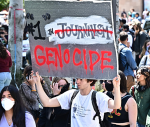You are here
Palestinian despair at boiling point
Oct 13,2015 - Last updated at Oct 13,2015
As Palestinian protests against Israeli occupation enter their third week, there is little evidence that Prime Minister Benjamin Netanyahu is aware of the political and security costs of the cycle of violence that he deliberately unleashed through his brash and poorly conceived policies in occupied East Jerusalem and the West Bank.
Whether this is indeed a third Intifada or not will become clear in the coming days.
The ramifications of Israel’s “iron fist” policy will be dire and answering peaceful protests with live ammunition will prove reckless and short-sighted.
Hamas and some Palestinian officials dubbed Palestinian protests, which spread to Israel proper and Gaza Strip, in addition to Jerusalem and the West Bank, as an Intifada.
Pundits say that what differentiates this from the last two uprisings is that it is leaderless; it is spontaneous and reflects the level of anger and frustration that tens of thousands of Palestinian youth feel two decades after the signing of the Oslo accords and the birth of the Palestinian Authority (PA).
In the absence of a genuine political process, Palestinians have lost faith in their leaders as Israel stepped up its plans to empty East Jerusalem of its Arab population, encroach on Al Aqsa compound and partition the West Bank, while maintaining a ruthless siege over the Gaza Strip.
In light of the increasing Israeli provocations and horrific crimes carried out by Jewish settlers against hapless Palestinians, it was a matter of time before young Palestinians, most of whom do not belong to any party or group, would decide to vent out their anger against their tormentors.
Despite the use of knive and stone against Israeli soldiers and Jewish settlers, this has been largely a peaceful uprising.
More than 30 Palestinians were killed, the majority in cold blood, in addition to four Jewish settlers. Over 500 Palestinians have been injured as occupation soldiers were encouraged to use live ammunition against youth throwing stones and firebombs.
The Palestinian leadership has been unable to take the initiative. President Mahmoud Abbas accused Israel of escalating tensions, but stopped short of carrying out his threats to halt security cooperation or disband the PA.
There is ferment among young Fateh cadre who have little faith in their leadership or in the promise of a two-state solution.
On the other side, Netanyahu is finding that he has little room to manoeuvre. His right-wing government is the most extreme in Israel’s history. His coalition partners want him to adopt even harsher measures and send in the army to occupy what is left of the West Bank.
Politically, he has nothing to offer Abbas, even as some observers talk of an attempt by the International Quartet to press for a resumption of peace talks in return for a settlement freeze.
This Palestinian uprising will not be overrun by the Israeli military or by Abbas’ own security personnel.
Palestinians are aware that if they relent now, there might not be another chance for them to tell the world about their plight and the great injustice they have suffered for many generations.
But it is also true that the world is slow to react.
The US appears unwilling to engage the two parties in an attempt to revive peace talks. The international community is focusing on Russia’s latest gambit in Syria, and the Arab countries are occupied with internal and regional crises.
The UN and the Arab League are paying lip service and some Arab leaders would like to see a quick end to this Palestinian uprising.
But it is also true that Israel is finding itself in a difficult position. The protests have spread inside Israel and Netanyahu’s militant response will not end the uprising as the media are forced to focus on Israel’s occupation and Palestinian despair.
One possible way out, as some Israelis suggest, would be for Netanyahu to wage another war on Gaza in order to shift attention from the peaceful uprising in the West Bank and East
Jerusalem.
Netanyahu, his right-wing ministers and Jewish settlers believed that provocations in Al Aqsa would facilitate changing the status quo in the Noble Sanctuary. They would have succeeded too, but Palestinian despair and anger have reached a boiling point.
What Israel did not expect, or want, is the flare up of a third Palestinian Intifada.
With Abbas losing political ground inside and outside Palestine, this new generation of Palestinians has become a ticking time bomb.
Israel has miscalculated when it decided to bury the two-state solution, while failing to honour its commitments under Oslo. Now all those associated with that accord are paying the price.
This is becoming an important milestone in the history of Palestinian national struggle.
It is doubtful that Israel’s iron fist policy or Abbas’ security men will be able to contain what is slowly turning into a widespread rebellion, one that rests on civil disobedience and peaceful rejection of occupation.
The writer is a journalist and political commentator based in Amman.













